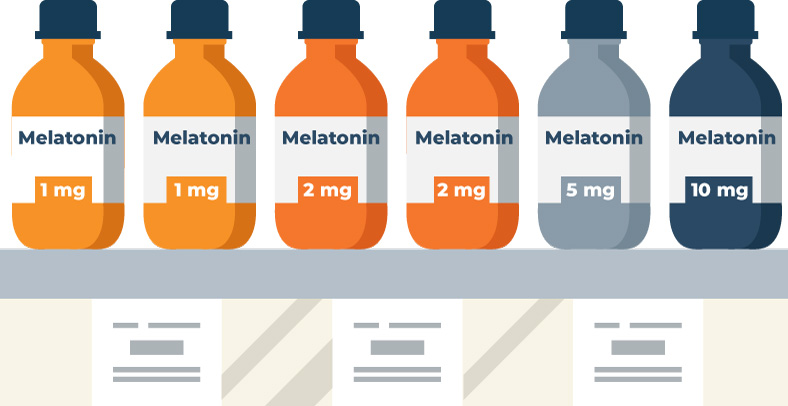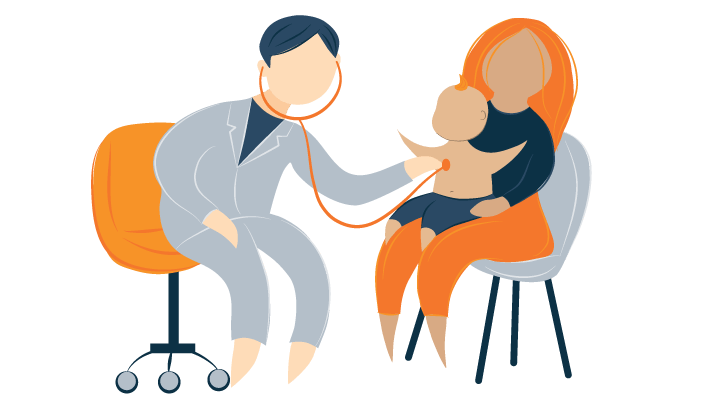Is it possible to overdose on melatonin? Can taking too much do harm?
Chances are if you’re asking this question — you’ve probably been experimenting with supplements to help you sleep.
Many people take melatonin supplements to try and help themselves fall asleep faster or overcome the symptoms of jet lag. If you’ve been counting sheep for hours, it may be tempting to pop a few pills to get some sleep. If it still doesn’t work, you might start getting desperate and decide to take a couple more pills to knock yourself out.
Is Melatonin Safe?
Most people feel perfectly safe taking an over-the-counter supplement like melatonin for sleep. In fact, melatonin is one of the most popular sleep aids.
Unlike most over-the-counter (OTC) products that come from plants, vitamins, and minerals, this one is a hormone that is produced naturally by the body and is linked to the circadian rhythm. Despite being considered a relatively safe supplement, OTC use of melatonin has been banned1 in Japan, Australia, the U.K., the European Union, and Canada. In these countries, the only way to take this hormone is as a prescription — but, why?
Investigations2 into OTC products have discovered that because melatonin is not regulated (like a prescription medication is), melatonin supplements may contain doses that vary anywhere from -83 percent up to +478 percent of what is labeled on the bottle. Additionally, some melatonin products also tested positive for serotonin, a neurotransmitter and controlled substance used to treat many neurological disorders.2
Need help? Check out our guide on the Best Melatonin Supplements.
Even though the synthetic alternative is somewhat similar to the natural melatonin produced in the body, it doesn’t come without risks. Higher doses could lead to unwanted side effects, especially for those with allergies/sensitivities, people taking medications that have known drug interactions with this hormone, pregnant individuals, and those with prediabetes/diabetes. This is why some countries only allow melatonin on a prescription basis – to better regulate just how much is actually in the dosage.
To answer the burning question, though, as to whether you can overdose on melatonin, the answer is yes – but it is important to note that an overdose is not the same as a lethal dose3. An overdose is merely taking a toxic amount of something that causes unwanted side effects. In some cases, an overdose can cause death, but in the case of melatonin, overdosing (or taking too high a dose) just causes side effects; it can not cause death.
In fact, research4 in which humans were given varying doses of melatonin in order to determine any toxicity did not find any conclusive evidence that melatonin was lethal.
To sum it up — melatonin is not known to be a potential cause of death, but that doesn’t mean it can’t cause side effects at high doses. You should always be aware of recommended dosages and possible complications so you avoid taking too much.
Melatonin Dosage
How Much Melatonin Should You Take?
The majority of studies on melatonin have researched doses ranging from 0.3 milligrams to 10 milligrams as the safest and most effective dose. However, the ideal dose also depends on age, weight, the problem you’re trying to address, along with any current medications that you’re taking. Generally speaking, the ideal dose is the lowest possible dose that provides the desired effects. According to the Cleveland Clinic5, you can start with 1 milligram of melatonin and increase that amount by an additional milligram every week until you get the desired effect. That said, most doctors recommend6 a maximum dosage of 5 milligrams for insomnia and remind patients that higher doses tend to work just as well as lower doses. In fact, in some patients who take very high doses, an inverse effect can occur, including side effects7 like anxiety, nightmares, headaches, and insomnia.
We recommend talking to your doctor before introducing melatonin or any other supplements, especially if you take other medications or have certain health conditions.
5mg Dosage
For insomnia, most doctors recommend a dosage of melatonin somewhere between 0.3 and 5 milligrams. In one study8 comparing the effects of 1 milligram and 5 milligrams, participants who took 5 milligrams showed an overall improvement in subjective sleep quality but actually slept for less time than those who took 1 milligram. The study also showed that 5 milligrams was the most effective dosage for jet lag.
10mg Dosage
10 milligrams is the highest dose that is typically used for treating sleep-related conditions and hasn’t been associated with side effects. In one classic study9 from 2000, researchers used 10 milligrams of melatonin to regulate circadian rhythm disorders in people who are blind. 10 milligrams was effective in this case, but the authors of the study concluded that this dose should always be supervised by a physician.
20mg Dosage
A 20-milligram dosage of melatonin should only be used for specific purposes under the supervision of a doctor. For example, some research10 has looked at the use of 20 milligrams of melatonin combined with cancer treatments like radiation and chemotherapy. The researchers found that melatonin could help lower the toxicity of certain substances in chemotherapy.10 They also found a decrease in adverse effects resulting from this treatment.10
30mg Dosage
A 30-milligram dosage is substantial. Some studies11 have used doses of 20-40 milligrams to prevent and treat clot-forming cells (thrombocytopenia) associated with cancer chemotherapy.
40mg Dosage
As mentioned above, doses in the range of 20-40 milligrams could help with clot-form cells linked to chemotherapy treatments.11 That being said, this amount is far too high to take on your own, and we would advise against this. If you or someone you know is a cancer patient experiencing clotting issues, you might consider bringing this up with the doctor though.
100mg Dosage
100 milligrams of melatonin is a serious dosage, and it shouldn’t be used at all. It’s important to note that taking this much melatonin would likely result in a lot of unwanted — and potentially harmful — side effects.
Melatonin Side Effects
Daytime Sleepiness
Drowsiness12 is one of the most visible and common side effects of taking too much melatonin, and this is particularly harmful if you take it at the wrong time of the day. For example, it could lead to increased risks when you are operating certain heavy machinery or driving, so always be sure to take melatonin about one or two hours before bedtime.
Hormonal Changes
When you’re taking a hormone supplement, hormonal changes are bound to happen. For example, some studies show that children who take melatonin during adolescence might experience delayed puberty13 since melatonin plays a vital role in triggering puberty.
Other studies have looked at melatonin’s positive impacts on fertility14 in people trying to get pregnant. Since we are still understanding how melatonin impacts other hormones in the body, there is some debate about taking melatonin while pregnant. Most agree it is safe, temporarily, at low doses, but always talk to your doctor first.
Headaches
Another possible consequence of taking too much melatonin is a severe headache in the morning.12 On the one hand, some research has found that melatonin supplements may help prevent headaches and migraines15. However, keep in mind that this hormone is produced in your brain and as such, taking more than what’s needed could lead to chemical imbalances and quickly spiral into the very thing you’re looking to prevent — headaches.
Dizziness
Dizziness could be another unpleasant side effect of taking too much melatonin.12 This symptom could also be triggered by an allergic reaction to the supplement. Either way, dizziness is unpleasant and is capable of severely disrupting your ability to function properly.
Paranoia
If you take a higher dose of melatonin than what’s necessary, you could experience delusions, paranoia, confusion, or hallucinations16, especially if you have major depression or a psychotic disorder. Melatonin is a hormone closely tied to other neurotransmitters that regulate mood and behavior, and therefore, higher doses could lead to chemical imbalances16. People with major depression or certain psychotic disorders are urged to speak to their doctor before adding in melatonin.
Stomach Issues
Stomach issues are another common side effect of melatonin, regardless of whether you take it in a regular amount or you overdose it.12 You may experience stomach issues such as diarrhea, vomiting, and nausea. Any of these symptoms could disrupt your day and make it harder to function normally.
Vivid Dreams and Nightmares
Another side effect of taking melatonin is vivid dreams or nightmares.12 This side effect occurs because supplementary melatonin seems to increase the amount of time we spend in REM sleep17– the stage of sleep when we dream. Spending more time in this sleep stage may give some people more vivid dreams or nightmares, however, this seems to be most true for those taking a high dose.17
Frequently Asked Questions
What is the lethal dose of melatonin?
Every single medicine has its own LD 5018, which is the lethal dose when 50 percent of the experimental subjects would die of exposure. Melatonin is known to be relatively safe, and in animal testing, an LD50 couldn’t be established.7
How long does melatonin last?
The plasma half-life for melatonin is short and ranges between 45 and 90 minutes19. This means that approximately only half of the dose remains in your system after this amount of time.19 While melatonin may help you fall asleep faster, it likely won’t help you to stay asleep or increase the quality of your sleep, unless you are taking an extended, or prolonged-release, melatonin supplement. Extended-release medications or supplements are designed to be released into the body over a longer period.
Why do people take melatonin?
Melatonin is the hormone released by our brains to foster sleep, and it is commonly used as an over-the-counter sleep aid to help with insomnia or jet lag.
Is taking melatonin habit-forming?
Taking melatonin is not considered to be habit-forming or to cause dependencies, and it is generally safe for short-term use. If you find yourself using it every day for longer than two weeks, it’s important to talk to your doctor about your symptoms to rule out underlying conditions causing problems with your sleep.
Is melatonin safe for kids?
Melatonin has been studied for children with certain conditions, such as ADHD and autism20. These studies show a lot of promise in terms of melatonin reducing certain symptoms and behaviors.20 There are limited studies about its effectiveness and safety in other children, though there is some concern about administering melatonin close to puberty as it may affect hormones12. If you’re considering letting your child use melatonin, talk to their pediatrician first.
Can kids overdose on melatonin?
Yes, kids can overdose on melatonin21 just as adults can, and the signs a child has taken too much can include an upset stomach, vomiting, diarrhea, and tiredness.
A 10-year study found that from 2012-2021, the number of children ingesting melatonin increased by as much as 530 percent22. They went on to say that hospitalizations and more severe symptoms also increased during this time, though these primarily resulted from unintentional ingestions. Among those more severe cases, five children had to be on mechanical ventilation and two children under the age of two had died.22 However, it’s important to add that children under the age of three23 are not recommended to take melatonin.
What should you do if you consume too much melatonin?
If you’re worried that you’ve taken too much melatonin, call your doctor or a poison control center. While melatonin is considered to be generally safe and has a low toxicity profile, it could cause unpleasant side effects and be dangerous for people with certain conditions or taking other medications.
What happens if I take melatonin with another medication?
According to the Mayo Clinic24, taking melatonin should be safe for most people, though in some circumstances it can interact with other medications such as blood thinners, blood pressure medications, anticonvulsants, oral contraceptives, and others. However, this doesn’t mean the interaction will be dangerous, in some cases, it may just inhibit melatonin’s ability to simulate drowsiness.
Before taking melatonin, be sure to discuss your current medications with your doctor to be sure it’s the right choice for you.
Conclusion
Melatonin is a natural hormone that the body produces, and it’s important for regulating many activities, including sleep. Melatonin in a supplement form can be helpful for sleep, and it’s known to be relatively safe with few side effects.
That being said, it is possible to take too much melatonin and experience unpleasant symptoms like headaches, drowsiness, an upset stomach, and others. The best way to avoid these symptoms is to start with the lowest possible dose. As always, before taking any supplement, speak with your doctor.

Jill Zwarensteyn
Editor
About Author
Jill Zwarensteyn is the Editor for Sleep Advisor and a Certified Sleep Science Coach. She is enthusiastic about providing helpful and engaging information on all things sleep and wellness.
Combination Sleeper
References:
- Grigg-Damberger MD, Madeleine M., Ianakieva MD, Dessislava. “Poor Quality Control of Over-the-Counter Melatonin: What They Say Is Often Not What You Get”. National Library of Medicine. 2017.
- Erland, Lauren A.E., Saxena PhD, Praveen K. “Melatonin Natural Health Products and Supplements: Presence of Serotonin and Significant Variability of Melatonin Content”. Journal of Clinical Sleep Medicine. 2017.
- “Drug overdose”. Victoria State Government. Webpage accessed July 30, 2023.
- Malhotra MD, Samir., Sawhney MD, Girish., Pandhi MD, Promila. “The Therapeutic Potential of Melatonin: A Review of the Science”. MedScape. Webpage accessed July 30, 2023.
- “Melatonin: How Much Should You Take?”. Cleveland Clinic. 2022.
- “Melatonin”. American Academy of Family Physicians. Last modified June 2023.
- Savage, Rosemary A., et al. “Melatonin”. National Library of Medicine. Last modified August 8, 2023.
- Costello, Rebecca B., et al. “The effectiveness of melatonin for promoting healthy sleep: a rapid evidence assessment of the literature”. National Library of Medicine. 2014.
- Sack, R.L., Brandes, R.W., et al. “Entrainment of free-running circadian rhythms by melatonin in blind people”. National Library of Medicine. 2000.
- Rondanelli, Mariangela., et al. “Update on the role of melatonin in the prevention of cancer tumorigenesis and in the management of cancer correlates, such as sleep-wake and mood disturbances: review and remarks”. National Library of Medicine. 2013.
- Wang, Yi., et al. “Therapeutic strategies of melatonin in cancer patients: a systematic review and meta-analysis”. National Library of Medicine. 2018.
- Bauer MD, Brent A. “Is melatonin a helpful sleep aid — and what should I know about melatonin side effects?”. Mayo Clinic. 2022.
- Boafo, Addo., et al. “Could long-term administration of melatonin to prepubertal children affect timing of puberty? A clinician’s perspective”. National Library of Medicine. 2019.
- Hu, Kai-Lan., et al. “Melatonin Application in Assisted Reproductive Technology: A Systematic Review and Meta-Analysis of Randomized Trials”. Frontiers in Endocrinology. 2020.
- Long MD, Rujin., Zhu MD, Yousheng., Zhou MD, Shusheng. “Therapeutic role of melatonin in migraine prophylaxis: A systematic review”. National Library of Medicine. 2019.
- “Melatonin”. Mental Health America. Webpage accessed August 31, 2023.
- “Can Melatonin Cause Bad Dreams? What Experts Say”. Cleveland Clinic. 2021.
- “What is a LD50 and LC50?”. Canadian Centre for Occupational Health and Safety. Last modified November 12, 2018.
- Carloni, Silvia., et al. “Melatonin Pharmacokinetics Following Oral Administration in Preterm Neonates”. National Library of Medicine. 2017.
- Wu, Zhou-yue., et al. “Autism spectrum disorder (ASD): Disturbance of the melatonin system and its implications”. ScienceDirect. 2020.
- “Melatonin Overdose in Children”. Cleveland Clinic. 2022.
- “Pediatric Melatonin Ingestions — United States, 2012–2021”. Centers for Disease Control and Prevention. Last modified June 2, 2022.
- Fliesler, Nancy. “Melatonin for kids: Is it effective? Is it safe?”. Boston Children’s Hospital. 2022.
- “Melatonin”. Mayo Clinic. Last modified March 3, 2021.

